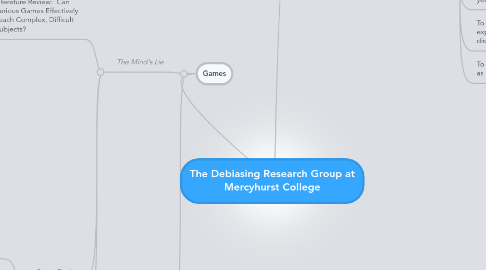
1. Games
1.1. The Mind's Lie
1.1.1. Literature Review: Can Serious Games Effectively Teach Complex, Difficult Subjects?
1.1.1.1. I. Serious Games and Game-based Learning
1.1.1.1.1. History
1.1.1.1.2. Recent Research Findings
1.1.1.1.3. Weaknesses
1.1.1.2. II. Cognitive Biases
1.1.1.2.1. Perfect example of a complex, difficult, social science subject
1.1.1.2.2. Well understood and relatively easy to elicit
1.1.1.2.3. Very difficult to identify in real life
1.1.1.2.4. Very difficult to mitigate (debias) even if identified
1.1.1.2.5. Standard pedagogical approaches have proven ineffective
1.1.1.3. III. Hypotheses
1.1.1.3.1. H1: A game-based learning approach will be effective in teaching students to identify and mitigate a variety of cognitive biases.
1.1.1.3.2. H2: A game-based learning approach will be more effective than an equivalent amount of time spent in traditional lecture and discussion in teaching students to identify and mitigate a variety of cognitive biases.
1.1.2. Game Design
1.1.2.1. Influences
1.1.2.1.1. Propaganda
1.1.2.2. Scenarios
1.1.2.3. Rules
1.1.3. Production
1.2. 5 point GWNNY
2. Goal: to teach intelligence analysts how to identify and mitigate the effects of cognitive biases.
2.1. Intentions
2.1.1. To focus on six specific cognitive biases
2.1.1.1. Confirmation Bias
2.1.1.2. Fundamental Attribution Error
2.1.1.3. Bias Blind Spot
2.1.1.4. Anchoring Bias
2.1.1.5. Representativeness Bias
2.1.1.6. Projection Bias
2.1.2. To design one or more tabletop games that will teach analysts how to identify and mitigate the effects of these biases.
2.1.3. To publish our games within the next year and our research within two years
2.1.4. To seek funding to continue and expand our research and to disseminate our games.
2.1.5. To expand the research agenda as interests and resources allow

